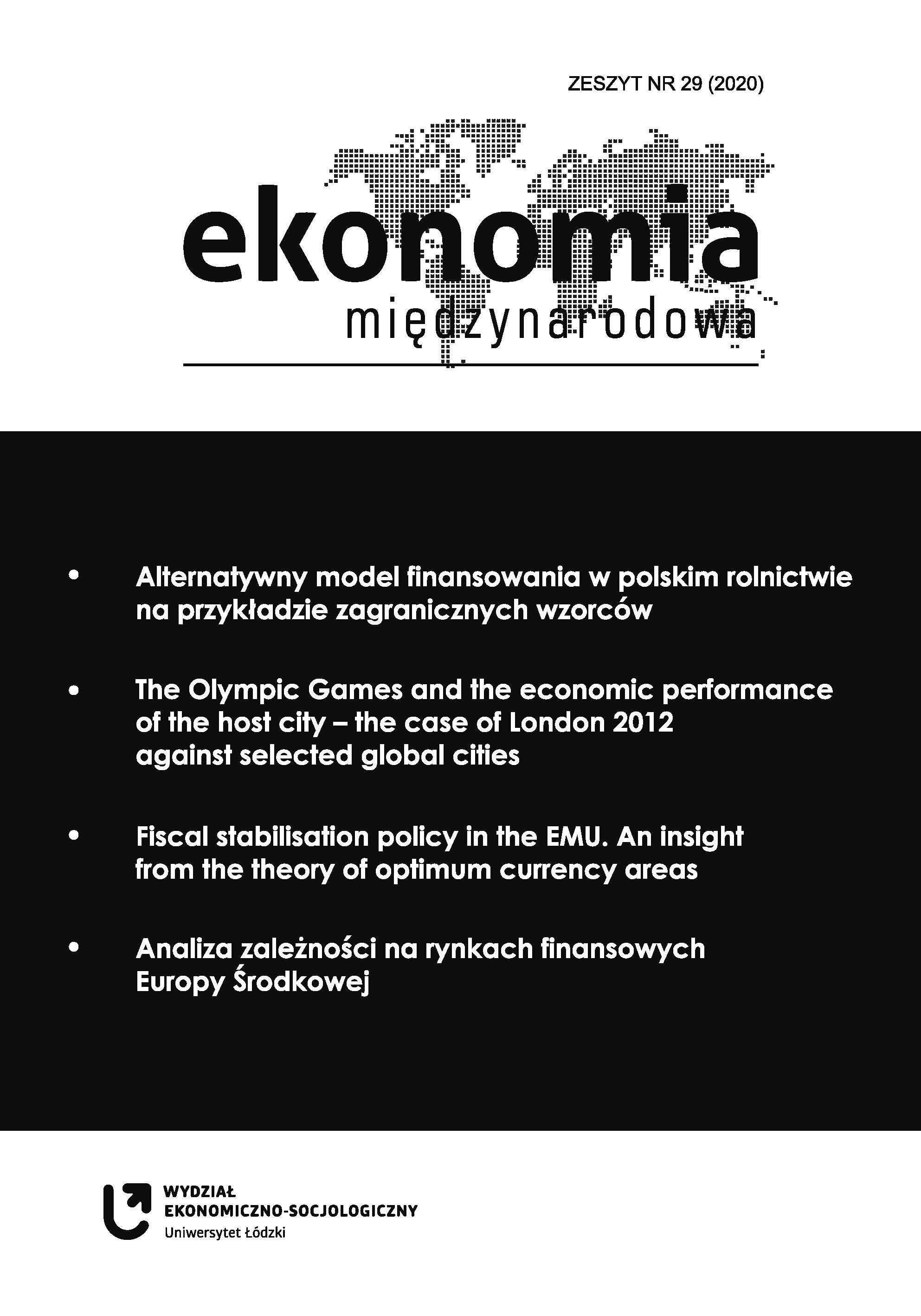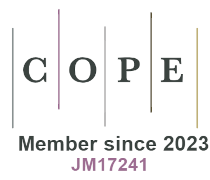Igrzyska olimpijskie a sytuacja gospodarcza miasta-gospodarza – przykład Londynu 2012 na tle wybranych miast globalnych
DOI:
https://doi.org/10.18778/2082-4440.29.02Słowa kluczowe:
igrzyska olimpijskie, wpływ ekonomiczny, miasta globalne, dynamikaAbstrakt
Wysoce konkurencyjna gospodarka globalna wzmaga tendencję poszukiwania nowych możliwości inwestycyjnych, mogących wygenerować impulsy rozwojowe w przestrzeni miejskiej. Jednym z tego typu przykładów jest organizacja igrzysk olimpijskich, która postrzegana jest jako ogromny projekt inwestycyjny realizowany w miastach-gospodarzach. Letnie Igrzyska Olimpijskie 2012 w Londynie były szeroko dyskutowane i analizowane, ze względu na bardzo ambitne plany rozwoju społeczno-gospodarczego i infrastrukturalnego dzięki organizacji wydarzenia. Na podstawie powyższych obserwacji, w artykule przyjęto dwa główne cele badawcze. Pierwszym z nich jest ocena dziedzictwa olimpijskiego w Londynie na podstawie krytycznego przeglądu literatury. Drugim celem badawczym jest ocena sytuacji gospodarczej Londynu jako olimpijskiego miasta-gospodarza na tle wybranych miast globalnych, opierając się na wybranych wskaźnikach ekonomicznych. W artykule zastosowano zarówno metody jakościowe, jak i ilościowe takie, jak krytyczny przegląd literatury oraz podstawowa statystyka opisowa zaprezentowana za pomocą serii wykresów oraz tabeli z uśrednionymi wskaźnikami ekonomicznymi jak stopa wzrostu PKB oraz stopa bezrobocia. Na podstawie przeglądu literatury i dokonanej analizy można stwierdzić, że plan wykorzystania organizacji Igrzysk Olimpijskich w Londynie oraz samo wydarzenie sprzyjały rozwojowi gospodarczemu oraz miejskiej regeneracji, w szczególności we wschodniej części miasta, jednakże pozytywnym skutkom towarzyszyły również negatywne efekty, m.in. w sferze społecznej i gospodarczej. Z kolei komparatywna analiza sytuacji gospodarczej Londynu jako miasta-gospodarza i pozostałych miast globalnych stanowiących grupy porównawcze pokazała, że w przyjętym zakresie czasowym, dynamika zmian wybranych wskaźników ekonomicznych jest relatywnie podobna w grupie miast europejskich, Ameryki Północnej oraz Australii, podczas gdy miasta azjatyckie jako grupa porównawcza zanotowały względnie lepszą sytuację gospodarczą mierzoną przyjętymi wskaźnikami w przeważającej części zakresu czasowego 2005–2018.
Bibliografia
Andranovich, G., Burbank, M.J., & Heying, C.H. (2001), Olympic Cities: Lessons Learned from Mega-Event Politics, Journal of Urban Affairs, 23(2), 113–131.
Google Scholar
DOI: https://doi.org/10.1111/0735-2166.00079
BBC. (2012, August 12), London 2012: IOC chief Jacques Rogge ‘very happy’ with Games, https://www.bbc.com/news/uk-19233495 (accessed: 18 June 2020).
Google Scholar
Bernstock, P. (2014), Olympic Housing: A Critical Review of London 2012’s Legacy, Routledge, London and New York.
Google Scholar
Bernstock, P., & Watt, P. (2017), Legacy for Whom? Housing in Post-Olympic East London, [in:] P. Cohen & P. Watt (Eds.), London 2012 and the Post-Olympic City: A Hollow Legacy? (pp. 91–138), Palgrave Macmillan, London.
Google Scholar
DOI: https://doi.org/10.1057/978-1-137-48947-0_4
Brunet, F. (1995), An economic analysis of the Barcelona’92 Olympic Games: Resources, financing and impacts, Centre d’Estudis Olímpics UAB, http://olympicstudies.uab.es/pdf/wp030_eng.pdf (accessed: 26 August 2019).
Google Scholar
Cashman, R. (2006), The Bitter-sweet Awakening: The Legacy of the Sydney 2000 Olympic Games, Walla Walla Press, Sydney.
Google Scholar
Chappelet, J.-L. (2012), Mega Sporting Event Legacies: A Multifaceted Concept. Papeles de Europa, 0(25), 76–86.
Google Scholar
DOI: https://doi.org/10.5209/rev_PADE.2012.n25.41096
Chen, Y., Qu, L., & Spaans, M. (2013), Framing the Long-Term Impact of Mega-Event Strategies on the Development of Olympic Host Cities, Planning Practice and Research, 28(3), 340–359.
Google Scholar
DOI: https://doi.org/10.1080/02697459.2013.750072
Crout, L.C. (2018), Forced Evictions, Homelessness, and Destruction: Summer ‘Games’? Olympic Violations of the Right to Adequate Housing in Rio de Janeiro, Notre Dame Journal of International & Comparative Law, 8(1), https://scholarship.law.nd.edu/ndjicl/vol8/iss1/7 (accessed: 19 November 2019).
Google Scholar
Davis, J. (2019), Avoiding white elephants? The planning and design of London’s 2012 Olympic and Paralympic venues, 2002–2018, Planning Perspectives, 1–22.
Google Scholar
DOI: https://doi.org/10.1080/02665433.2019.1633948
DCMS. (2013). Report 5: Post-Games Evaluation. Meta-Evaluation of the Impacts and Legacy of the London 2012 Olympic Games and Paralympic Games [Summary Report], Department for Culture Media & Sport, https://assets.publishing.service.gov.uk/government/uploads/system/uploads/attachment_data/file/224181/1188-B_Meta_Evaluation.pdf (accessed: 3 March 2016).
Google Scholar
Dolan, P., Kavetsos, G., Krekel, C., Mavridis, D., Metcalfe, R., Senik, C., Szymanski, S., & Ziebarth, N.R. (2019), Quantifying the intangible impact of the Olympics using subjective well-being data, Journal of Public Economics, 177, 1–14.
Google Scholar
DOI: https://doi.org/10.1016/j.jpubeco.2019.07.002
Duignan, M.B. (2019), London’s local Olympic legacy: Small business displacement, ‘clone town’ effect and the production of ‘urban blandscapes’, Journal of Place Management and Development, 12(2), 142–163.
Google Scholar
DOI: https://doi.org/10.1108/JPMD-05-2018-0033
Essex, S., & Chalkley, B. (1998), Olympic Games: Catalyst of urban change, Leisure Studies, 17(3), 187–206.
Google Scholar
DOI: https://doi.org/10.1080/026143698375123
Euromonitor International. (2020), Passport + Cities + Industrial database, https://go.euromonitor.com/passport.html (accessed: 16 June 2020).
Google Scholar
Evans, G., & Edizel, Ö. (2017), London 2012, [in:] J. Gold & M. Gold (Eds.), Olympic Cities. Routledge, London and New York, NY.
Google Scholar
Furrer, P. (2002), Sustainable Olympic Games, Bollettino Della Società Geografica Italiana, VII(4), 31.
Google Scholar
GaWC. (2018), The World According to GaWC 2018, Globalization and World Cities Research Network, https://www.lboro.ac.uk/gawc/world2018t.html (accessed: 2 July 2020).
Google Scholar
Gold, J.R., & Gold, M.M. (2015), Framing the future: Sustainability, legacy and the 2012 London Games, [in:] R. Holt & D. Ruta (Eds.), Routledge handbook of sport and legacy: Meeting the challenge of major sports events (1st Edition, pp. 142–158), Routledge, London and New York.
Google Scholar
DOI: https://doi.org/10.4324/9780203132562-12
Golob, B. (2020, April 1), Postponed Olympics retains 2020 naming, branding, Transform magazine, https://www.transformmagazine.net/articles/2020/postponed-olympics-retains-2020-naming-branding/ (accessed: 3 July 2020).
Google Scholar
Gratton, C., & Preuss, H. (2008), Maximizing Olympic Impacts by Building Up Legacies, The International Journal of the History of Sport, 25(14), 1922–1938.
Google Scholar
DOI: https://doi.org/10.1080/09523360802439023
HM Government, & Mayor of London. (2016), Inspired by 2012: The legacy from the Olympic and Paralympic Games [Fourth annual report – summer 2016], https://assets.publishing.service.gov.uk/government/uploads/system/uploads/attachment_data/file/544197/1776-E_Legacy_Report_2016_ACCESSIBLE.pdf (accessed: 3 July 2020).
Google Scholar
Horne, J., & Whannel, G. (2020), Understanding the Olympics (Third Edition). Routledge, London.
Google Scholar
DOI: https://doi.org/10.4324/9780429345272
Hotchkiss, J.L., Moore, R.E., & Zobay, S.M. (2003), Impact of the 1996 Summer Olympic Games on Employment and Wages in Georgia, Southern Economic Journal, 69(3), 691.
Google Scholar
DOI: https://doi.org/10.2307/1061702
IOC. (2014), Olympic Agenda 2020: 20 + 20 Recommendations, International Olympic Committee, https://stillmed.olympic.org/Documents/Olympic_Agenda_2020/Olympic_Agenda_2020-20-20_Recommendations-ENG.pdf (accessed: 1 July 2020).
Google Scholar
IOC. (2017), Legacy Strategic Approach: Moving Forward, IOC, https://www.olympic.org/~/media/Document%20Library/OlympicOrg/Documents/Olympic-Legacy/IOC_Legacy_Strategy_Full_version.pdf?la=en (accessed: 24 September 2018).
Google Scholar
IOC. (2018), Olympic Agenda 2020. Olympic Games: The New Norm [Report by the Executive Steering Committee for Olympic Games Delivery], International Olympic Committee, https://stillmed.olympic.org/media/Document%20Library/OlympicOrg/News/2018/02/2018-02-06-Olympic-Games-the-New-Norm-Report.pdf#_ga=2.128045071.2055400892.1593724496-1399807603.1588276354 (accessed: 3 July 2018).
Google Scholar
IOC. (2020, March 30), IOC, IPC, Tokyo 2020 Organising Committee and Tokyo Metropolitan Government announce new dates for the Olympic and Paralympic Games Tokyo 2020, https://www.olympic.org/news/ioc-ipc-tokyo-2020-organising-committee-and-tokyo-metropolitan-government-announce-new-dates-for-the-olympic-and-paralympic-games-tokyo-2020 (accessed: 3 July 2020).
Google Scholar
Kasimati, E. (2003), Economic aspects and the Summer Olympics: A review of related research, International Journal of Tourism Research, 5(6), 433–444.
Google Scholar
DOI: https://doi.org/10.1002/jtr.449
Kasimati, E., & Dawson, P. (2009), Assessing the impact of the 2004 Olympic Games on the Greek economy: A small macroeconometric model, Economic Modelling, 26(1), 139–146.
Google Scholar
DOI: https://doi.org/10.1016/j.econmod.2008.06.006
Kenyon, J.A., & Bodet, G. (2018), Exploring the domestic relationship between mega-events and destination image: The image impact of hosting the 2012 Olympic Games for the city of London, Sport Management Review, 21(3), 232–249.
Google Scholar
DOI: https://doi.org/10.1016/j.smr.2017.07.001
Kissoudi, P. (2008), The Athens Olympics: Optimistic Legacies – Post-Olympic Assets and the Struggle for their Realisation, The International Journal of the History of Sport, 25(14), 1972–1990.
Google Scholar
DOI: https://doi.org/10.1080/09523360802439049
Kissoudi, P. (2010), Athens’ Post-Olympic Aspirations and the Extent of their Realisation, The International Journal of the History of Sport, 27(16–18), 2780–2797.
Google Scholar
DOI: https://doi.org/10.1080/09523367.2010.508269
London Legacy Development Corporation. (n.d.), Queen Elizabeth Olympic Park, https://www.queenelizabetholympicpark.co.uk/the-park (accessed: 19 June 2020).
Google Scholar
London’s Growth Boroughs. (n.d.), Convergence Annual Report 2015–2016, London’s Growth Boroughs, https://static1.squarespace.com/static/50b4ab77e4b-0214dc1f631e9/t/58977d7b29687ff9f4cbd575/1486323077253/Convergence+Annual+Report+15-16+fin.pdf (accessed: 4 February 2019).
Google Scholar
Mayor of London. (2004), The London Plan. Spatial Development Strategy for Greater London, Greater London Authority, https://www.london.gov.uk/sites/default/files/the_london_plan_2004.pdf (accessed: 1 May 2020).
Google Scholar
Open Economics & CEIS-Tor Vergata. (2016), Economic Impact Assessment of the Rome 2024 Olympic and Paralympic Games. Technical Report.
Google Scholar
Poynter, G. (2017), East London’s Post-Olympic Economy, [in:] P. Cohen & P. Watt (Eds.), London 2012 and the Post-Olympics City (pp. 27–51), Palgrave Macmillan, London.
Google Scholar
DOI: https://doi.org/10.1057/978-1-137-48947-0_2
Preuss, H. (2007), The Conceptualisation and Measurement of Mega Sport Event Legacies, Journal of Sport & Tourism, 12(3–4), 207–228.
Google Scholar
DOI: https://doi.org/10.1080/14775080701736957
Rocha, G., Araújo, H.E., & Machado de Codes, A.L. (2018), Impactos Econômicos dos Jogos Rio 2016 no Município e na Região Metropolitana do Rio de Janeiro (No. 2438), Brazil Institute for Applied Economic Research (IPEA), https://www.econstor.eu/bitstream/10419/211389/1/1046127535.pdf (accessed: 4 January 2020).
Google Scholar
Roche, M. (2017), Mega-events and Social Change: Spectacle, Legacy and Public Culture, Manchester University Press, Manchester.
Google Scholar
DOI: https://doi.org/10.7228/manchester/9781526117083.001.0001
Sassen, S. (2005), The Global City: Introducing a Concept, Brown Journal of World Affairs, 11(2), 27–43.
Google Scholar
Scandizzo, P.L., & Pierleoni, M.R. (2018), Assessing the Olympic Games: The Economic impact and beyond, Journal of Economic Surveys, 32(3), 649–682.
Google Scholar
DOI: https://doi.org/10.1111/joes.12213
Shoval, N. (2002), A New Phase in the Competition for the Olympic Gold: The London and New York Bids for the 2012 Games, Journal of Urban Affairs, 24(5), 583–599.
Google Scholar
DOI: https://doi.org/10.1111/1467-9906.00146
Tolzmann, M.C. (2014), Global localities: Olympic bidding as a case study in globalisation, Sport in Society, 17(5), 593–608.
Google Scholar
DOI: https://doi.org/10.1080/17430437.2013.834626
University of East London. (2015), Olympic Games Impact Study – London 2012 Post-Games Report: December 2015, University of East London, London.
Google Scholar
Vadiati, N. (2020), The Employment Legacy of the 2012 Olympic Games: A Case Study of East London, Springer Singapore.
Google Scholar
DOI: https://doi.org/10.1007/978-981-15-0598-0
Watt, P. (2013), ‘It’s not for us’: Regeneration, the 2012 Olympics and the gentrification of East London, City, 17(1), 99–118.
Google Scholar
DOI: https://doi.org/10.1080/13604813.2012.754190
Zawadzki, K. (2017), Ekonomiczne efekty organizacji wielkoformatowych wydarzeń sportowych, Wydawnictwo Politechniki Gdańskiej, Gdańsk.
Google Scholar
Zhang, Y., & Zhao, K. (2007), Impact of Beijing Olympic-related Investments on Regional Economic Growth of China: Interregional Input-Output Approach, Asian Economic Journal, 21(3), 261–282.
Google Scholar
DOI: https://doi.org/10.1111/j.1467-8381.2007.00257.x
Zimbalist, A. (2016), Circus Maximus: The Economic Gamble Behind Hosting the Olympics and the World Cup (2nd Edition), Brookings Institution Press, Washington DC, United States.
Google Scholar
Pobrania
Opublikowane
Jak cytować
Numer
Dział
Licencja

Utwór dostępny jest na licencji Creative Commons Uznanie autorstwa – Użycie niekomercyjne – Bez utworów zależnych 4.0 Międzynarodowe.









